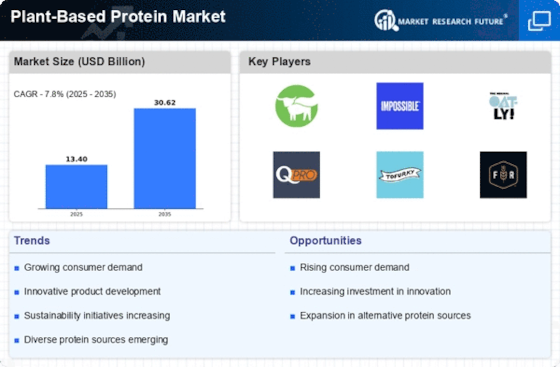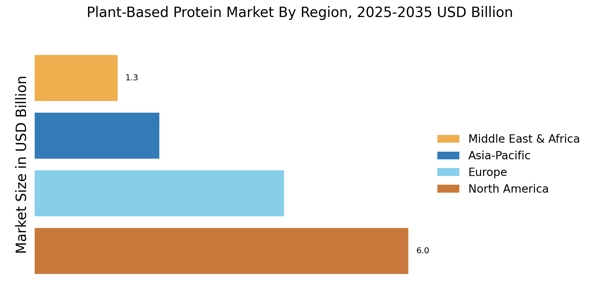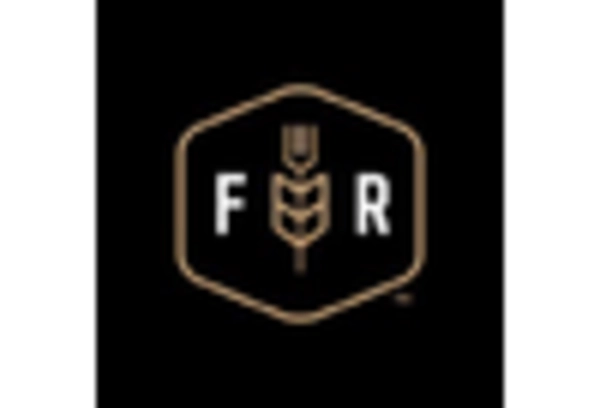Changing Consumer Preferences
The Plant-Based Protein Market is witnessing a transformation in consumer preferences, with a growing inclination towards plant-based diets. This shift is influenced by various factors, including health benefits, ethical considerations, and environmental concerns. Surveys indicate that nearly 40% of consumers are actively seeking plant-based protein options, reflecting a significant change in dietary habits. Additionally, the rise of social media and influencer marketing has amplified awareness and acceptance of plant-based diets, further driving demand. As more consumers prioritize plant-based options, the market is likely to see an influx of new products and brands, enhancing competition and variety within the Plant-Based Protein Market.
Rising Demand for Plant-Based Proteins
The Plant-Based Protein Market experiences a notable surge in demand as consumers increasingly prioritize health and wellness. This trend is reflected in the growing number of individuals adopting vegetarian and vegan diets, which has been reported to increase by approximately 20% in recent years. The shift towards plant-based diets is driven by a desire for healthier lifestyles, as plant-based proteins are often perceived as lower in saturated fats and higher in essential nutrients. Furthermore, the market is projected to reach a valuation of over 20 billion dollars by 2027, indicating a robust growth trajectory. This rising demand is likely to encourage manufacturers to innovate and diversify their product offerings, thereby enhancing the overall competitiveness of the Plant-Based Protein Market.
Environmental Sustainability Initiatives
The Plant-Based Protein Market is significantly influenced by the increasing awareness of environmental sustainability. As climate change concerns escalate, consumers are gravitating towards plant-based proteins, which are generally associated with lower carbon footprints compared to animal-based proteins. Research indicates that producing plant-based proteins can require up to 90% less water and generate fewer greenhouse gas emissions. This shift is not only a response to consumer preferences but also aligns with corporate sustainability goals, as many companies are committing to reducing their environmental impact. The market is expected to benefit from this trend, with projections suggesting that plant-based protein sales could grow by 25% annually as more consumers seek eco-friendly alternatives.
Regulatory Support for Plant-Based Products
Regulatory support is emerging as a key driver for the Plant-Based Protein Market. Governments and regulatory bodies are increasingly recognizing the importance of plant-based proteins in promoting public health and sustainability. Initiatives aimed at encouraging plant-based diets are being implemented, including subsidies for plant-based food producers and educational campaigns about the benefits of plant-based nutrition. This supportive regulatory environment is likely to foster innovation and investment in the sector, as companies seek to align with government objectives. As a result, the market is expected to grow, with estimates suggesting that plant-based protein consumption could double within the next decade, further solidifying its position in the Plant-Based Protein Market.
Technological Advancements in Food Production
Technological advancements play a crucial role in shaping the Plant-Based Protein Market. Innovations in food processing and production techniques have led to the development of high-quality plant-based protein products that closely mimic the taste and texture of meat. For instance, advancements in extrusion technology and fermentation processes have enabled manufacturers to create more appealing and nutritious plant-based options. This has resulted in a broader acceptance of plant-based proteins among consumers, including those who are not strictly vegetarian or vegan. The market is projected to expand as these technologies continue to evolve, potentially increasing the market share of plant-based proteins to 30% of the total protein market by 2030.

















